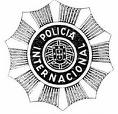Polícia Internacional e de Defesa do Estado
|
|||
|---|---|---|---|
| State level | Direcção-Geral de Segurança | ||
| Position of the authority | Secret police | ||
| Supervisory authority (s) | Ministério da Administração Interna | ||
| Consist | since October 22, 1945 dissolution: November 24, 1969 |
||
| Headquarters | Rua António Maria Cardoso 18-26, Lisbon | ||
The Polícia Internacional e de Defesa do Estado ( German International Police and State Security ), better known as PIDE , was a secret police in Portugal under the rule of António de Oliveira Salazar and Marcelo Caetano . As the secret state police, she ensured that opposition members disappeared in prison. The headquarters of the PIDE was at Rua António Maria Cardoso 18-26 in Lisbon .
history
The PIDE was founded on October 22, 1945 and replaced the PVDE ( Polícia de Vigilância e Defesa do Estado ) , which was founded in 1933 with the support of German and Italian consultants . The predecessor PVDE and PIDE were a tool of political justice and oppression and had numerous special courts and special prisons. These were set up with the help of the German Gestapo , who provided their knowledge of rooms for torturing opposition members and for archiving secret service material.
Over the years, the state police built up an extensive network of informants and spies. In this way she succeeded in creating comprehensive police-state surveillance of public and private life. In 1945 it was renamed PIDE. The model for structuring the various departments was no longer the German Gestapo, but the British Scotland Yard . It was supposed to suppress any opposition in Portugal to the authoritarian regime of the Estado Novo .
As a state terrorist instrument, the PIDE in Portugal was particularly feared by the opposition. When the liberal opposition candidate Humberto Delgado received around 24% of the vote in the 1958 presidential election despite massive election manipulation by the PIDE, he was later released from the army and forced to flee to Brazil . From there, he continued to support oppositional actions in Portugal, including in 1961 in the Santa Maria affair . During his attempt to return, Humberto Delgado was murdered by a PIDE task force on the Portuguese-Spanish border in 1965.
Outside of Portugal, the actions of the PIDE were hardly known. That only changed in the course of the colonial wars, when the agents tried several times to murder the independence fighter Amílcar Cabral from Guinea-Bissau, among others . The main prison for the political police was in Caxias and was stormed on April 27, 1974 during the Carnation Revolution. In the Cape Verdean town of Tarrafal , a concentration camp was also set up in 1936, which became known throughout the Portuguese-ruled area as the Tarrafal concentration camp and later internationally. In 1965, the PIDE founded a counterinsurgency unit in Angola , the Flechas , which consisted almost entirely of natives and was used against the supply lines of the rebel groups.
On September 24, 1969, the PIDE was dissolved by Marcelo Caetano and replaced by the DGS ( Direção-Geral de Segurança ). The methods and goals remained the same.
literature
- Dalila Cabrita Mateus: A PIDE / DGS na guerra colonial (1961–1974) , Terramar, Lisbon 2004 ISBN 978-972-710-369-0
- Irene Flunser Pimentel: A História da Pide. Temas & Debates, Lisbon 2011 ISBN 978-972-759-956-1
- António S. Oliveira: PIDE. Edições Mortas, Porto 1999, ISBN 978-972-831-313-5
- Valdemar Cruz, José Pedro Castanheira: A Filha Rebelde. Temas & Debates, Lisbon 2011 ISBN 978-989-644-170-8 (book of the daughter of the last secret service chief)
- Fernando Gouveia, Irene Flunser Pimentel: Biografia e um Inspector da PIDE A Esfera dos Livros, Lisbon 2008 ISBN 9789896261344
Web links
- Contemporary history - The long shadow of Salazar . portugalmania.de. Retrieved April 6, 2015
Movie
- 2010: 48 ; Director: Susana de Sousa Dias (award-winning documentary that combines statements by former PIDE prisoners about their various experiences of torture)
Individual evidence
- ↑ Portugal - the oldest nation-state in Europe ( Memento of the original from April 3, 2015 in the Internet Archive ) Info: The archive link was inserted automatically and has not yet been checked. Please check the original and archive link according to the instructions and then remove this notice. . living-in-portugal.info. Retrieved April 6, 2015
- ↑ SEAT OF THE PIDE . lissabonline.de. Retrieved April 6, 2015
- ↑ The emergence of the Estado Novo (German: New State) . tu-chemnitz.de. Retrieved April 6, 2015
- ↑ Walther L. Bernecker , Horst Pietschmann: History of Portugal. From the late Middle Ages to the present. (= Beck series 2156 - CH Beck Wissen ). CH Beck, Munich 2001, ISBN 3-406-44756-2 , p. 115 .
